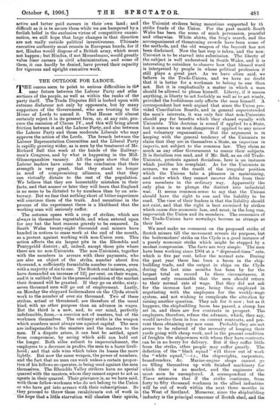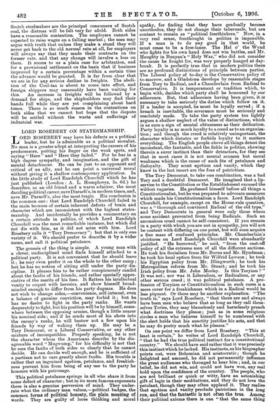THE OUTLOOK FOR LABOUR.
THE omens seem to point to serious difficulties in the
near future between the Labour Party and othe , sections of the people, as well as within the ranks of the party itself. The Trade Disputes Bill is looked upon with 'extreme disfavour not only by opponents, but by many supporters of the Government, who are trusting to the House of Lords to amend it. That House will almost certainly reject it in its present form, or, at any rate, pro- cure the omission of Clause IV., and this will bring about friction between it and the Labour Party, and also between the Labour Party and those moderate Liberals who may approve the action of the Lords. The breach between the Labour Representation Committee and the Liberal Party is rapidly growing wider, as is seen by the treatment of Mr. Richard Bell this week at the hands of the Railway- men's Congress, and by what is happening in the Ricci_ Glamorganshire vacancy. All the signs show that the Labour leaders have come to the conclusion that their strength is very great, that they stand no longer in need of compromising alliances, and that they can virtually dictate to the rest of the population. _ We believe that they are lamentably mistaken in their facts, and that sooner or later they will learn that England is no more to be dictated to by numbers than by an aris- tocracy. But we fear that nothing short of bitter experience .will convince them of the truth. And meantime in the process of the experiment there is a likelihood that the working man will seriously suffer.
. The autumn opens with a crop of strikes, which are always in themselves regrettable, and when entered upon for any but the best reasons gravely to be censured. In South Wales twenty-eight thousand coal miners have
• handed in notices to cease work at the end of the month, as a protest against working with non-Union men. This action affects the six largest pits in the Rhondda and Pontypridd district ; all, indeed, except those pits where there are no non-Unionists. The non-Unionists, together with the members in arrears with their payments, who are also an object of the strike, number about five thousand, a sufficiently formidable number to coerce, even with a majority of six to one. The Scotch coal miners, again, have demanded an increase of 14 per cent. on their wages, 'and it is unlikely that in the present condition of the market
• their demand will be granted. If they go on strike, sixty- seven thousand men will go out of employment. Lastly, • on Monday the shipyard boilermakers on the Clyde struck work to the number of over six thousand. Two of these strikes, actual or threatened, are therefore of the usual kind, with no other purpose than an advance in wages. But the third is a new, and, to our mind, perfectly • indefensible, form,—a coercion not of masters, but of the • workmen themselves. The ordinary strike is the weapon which numbers must always use against capital. The men are indispensable to the masters and the masters to the • men. If a dispute arises, it can best be settled, apart from compromise, by seeing which side can hold out the longer. Both sides . submit to impoverishment, the • employers to a decrease in profits, the men to a barer liveli- hood; and that side wins which takes its losses the more lightly. But now the same weapon, the power of numbers, and the fact that no man can work unless a certain propor- tion ef his fellowsco-operates, is being used against the men ahemselves. The Rhondda Valley strikers have no special quarrel with the masters, whom they cannot expect to act as • agents in their quarrel. Their grievance is, as we have said, with those fellow-workmen who do not belong to the Union or who have got into arrears with their subscriptions. So • they proceed to throw these recalcitrants out of work in •
the hope that a little starvation will chasten their spirits, the Unionist strikers being meantime supported by th strike funds of the Union. For the past mouth South Wales has been the scene of much persuasion, peaceful and otherwise. White shirts, the frog's march, and the accompaniment of threatening crowds have been some of the methods, and the old weapon of the boycott has not been disdained. Now the last step is taken, and the non- Unionist is to be starved into submission. The liberty of the subject is well understood in South Wales, and it is interesting to outsiders to observe how that blessed word is interpreted by people in whose political profession it still plays a great part. As we have often said, we believe in the Trade-Unions, and we have no doubt that it is better for a workman to belong to one than not. But it is emphatically a matter in which a man should be allowed. to please -himself. Liberty, if it means anything, is liberty to act foolishly as well as to act wisely, provided the foolishness only affects the man himself. A. correspondent last week argued that since the Union pro- vided Conciliation Boards, and in general superintended. the men's interests, it was only fair that non-Unionists should pay -for benefits which they shared equally with Unionists. This doctrine is sound if applied to a State, but it seems to us most dangerous if applied to any miller and voluntary organisation. But the argument is in keeping with the general tendency of the Unionists to claim that they are in themselves a State, an imperium in imperio, not subject to the common law. They claim as much as any other Government to coerce their subjects. It is Socialism run mad, and if Mr. Bell, as an old Trade- Unionist, protests against Socialism, here is an instance which justifies his complaint. As for the Unionists in arrears, we see the result of the irregular position which the Unions take a pleasure in rqaintaining, and under which they cannot recover debts from their own members in the ordinary way. Apparently the only plan is to plunge the district into industrial war. It seems common-sense to say that the Unions should have the right to sue and the liability to be sued. The view of their leaders is that the liability should not exist, and that the right is best exercised by strikes which cause dire economic loss, and must, in the long run, impoverish the Union and its members. The economics of the Trade-Unions have nowadays become as strange as their law.
We need make no comment on the proposed strike of Scotch miners till the movement reveals its purpose, but the boilermakers' strike on the Clyde is a. good instance of a purely economic strike which might be stopped by a modest compromise. The facts are very simple. The men have been working since 1904 at a " depressed-time " rate, which is five per cent. below the normal rate. During the past year there has been a boom in the ship- building trade, and the output in ships on the Clyde during the last nine months has been by far the largest total on record. In these circumstances, it seemed only reasonable that the men should return to their normal rate of wage. But they did not ask for the increase last year, being then employed in negotiating with the employers for the weekly-wage system, and not wishing to complicate the situation by raising another question. They ask for it now ; but as it happens, the shipbuilding boom has passed, a slump has set in, and there are few contracts in prospect. The employers, therefore, refuse the advance, which, they say, would involve them in loss on current contracts, and pre- vent them obtaining any new ones. Probably they are not averse to be relieved of the necessity of keepiug their yards going with cheap work, and in the present condition of freights the shipowners with whom they have contracts can be in no hurry for delivery. But if they suffer little from the strike, other people may suffer greatly. The defection of the "black squad" will throw out of work the "white squad,"—i.e., the shipwrights, carpenters, brassfounders, Spe. Marine-engine shops cannot go on filling themselves up with finished machinery for which there is no market, and the engineers also must soon be unemployed. A correspondent of the Times estimates that if the strike continues, from forty to fifty thousand workmen in the allied industries will be out of work within the next three months in the West of Scotland. Moreover, since the shipbuilding industry is the principal consumer of Scotch steel, and the Scotch steelmakers are the principal consumers of Scotch coal, the distress will be felt very far afield. Both sides have a reasonable contention. The employers cannot be expected to raise wages on a falling market ; the men may argue with truth that unless they make a. stand they will never get back to the old normal rate at all, for employers will always say that they made their contracts on the former rate, and that any change will involve a, loss on them. It seems to us a plain case for arbitration, and for a provisional settlement on the basis that if business improved by a certain percentage within a certain time the advance would be granted. It is far from clear that we are in for any serious decline in freights. The aboli- tion of the Coal-tax is about to come into effect, and foreign shippers may reasonably have been waiting for this. An increase in freights will be followed by a demand for ships, and the shipbuilders may find their hands full while they are yet complaining about hard times. There is so much reason in the contentions on both sides that we cannot but hope that the dispute will be settled without the waste and sufferings of industrial war.































































 Previous page
Previous page